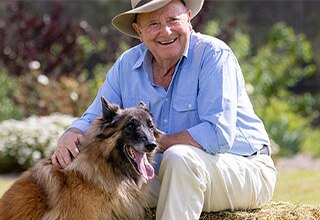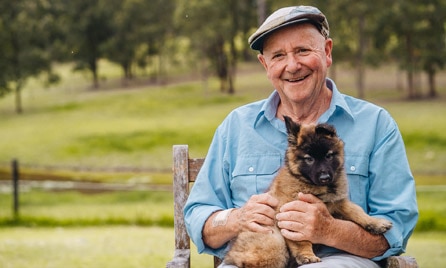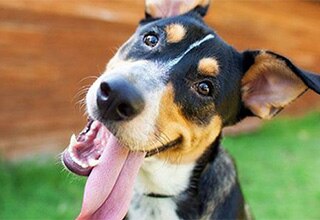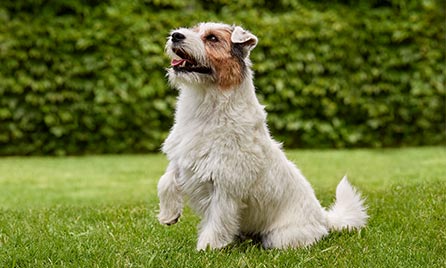- text
-
Everyday Pet Insurance policies entered into for the first time prior to 17 July 2023 and subsequent renewals of those policies are issued by The Hollard Insurance Company Pty Ltd ABN 78 090 584 473, AFSL 241436 (Hollard), arranged and administered by PetSure (Australia) Pty Ltd ABN 95 075 949 923, AFSL 420183 (PetSure) and promoted and distributed by Hollard’s Authorised Representative (AR) Woolworths Group Limited ABN 88 000 014 675, AR 245476 (Woolworths).
Everyday Pet Insurance policies entered into for the first time on or after 17 July 2023 and subsequent renewals of those policies are issued by PetSure and promoted and distributed by PetSure’s AR, Woolworths.Dr Harry Cooper (AR No.1000933) is an AR of PetSure and promotes Everyday Pet Insurance policies.
Any advice provided is general only and does not take into account your individual objectives, financial situation or needs. Please consider the Product Disclosure Statement (PDS) to ensure this product meets your needs before purchasing, or choosing to continue with the product. PDS and Target Market Determination available at insurance.everyday.com.au/pet-insurance.
Puppies and their behaviours.
Dr Harry shares his tips and tricks on puppies and their behaviours.
Pet Insurance | 3 minute read | 22 January 2025
Dr Harry: Puppies and their behaviours.
You’ve decided to buy a puppy - great! It is a big decision and selecting one that suits your lifestyle is very important. Puppies come with new behaviours that you may need to adjust to, such as digging and chewing. Understanding some of these behaviours and how you can deal with them can help you with your new furry family member. Here are a few tips:
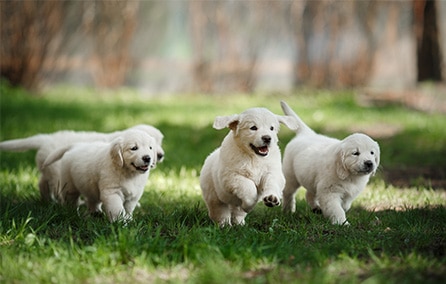
Research your dog breed and prepare your home.
Firstly, it's important to research your choice. Breeders can sometimes be biased towards their own breed; use the internet, go to dog shows and obedience clubs, and talk to owners who have the same breed as you are considering to understand their behaviours. Do not fall for the proposition that cross breeds are free from inherited problems. It is just not true!
The next major decision is deciding whether the puppy/dog will live inside or outside, or both. In any case you need to make sure all fences and gates are escape proof, and lockable. Check your garden for toxic plants. Make sure any poisonous substances like rat bait and snail killer are locked away out of reach.
Puppies love to explore. They are very much like children, but there is one big difference. They do not have hands. Instead they have a very well equipped set of front feet, just made for digging and a mouth that substitutes very nicely for a pair of human hands. They love to dig, and they love to chew! That's their way of exploring the world.
Why do dogs dig?
Dogs dig for a good many reasons. Often it is just a game; trying to dig up something that they think is under the lawn, or perhaps boredom. Some holes are enormous, and these allow the culprit to lie at full length because it is generally cooler in the hole. They often choose the garden, where you have just planted something new. Here they smell the fertiliser in the potting mix and that encourages the behaviour. Dogs also love to bury their food. It's a behaviour that goes back to ancient times when a pack of dogs would bury what they could not eat and dig it up later on. Our modern day dogs have not forgotten this. I really do not think you can stop dogs from digging. For them it is normal behaviour.
How do you attempt to control the digging situation? Burying their manure in the hole to deter your pup is a waste of time. They’ll dig another hole right beside it. Build them a digging pit, where they can get rid of all this excess energy. You can use a clam shell for small breeds or construct a square of treated pine logs and half fill either with white sand. To encourage your pet to use the pit, bury treats in the sand and encourage your pup to dig, by saying 'dig, dig, dig', in an excited voice and demonstrating with your hands. Cooked chicken, cheese or cat biscuits are great. Even toys will work. Your pup will continue to dig in your pit, because as long as you keep baiting it, there is a reward.
How to stop your dog from chewing everything.
The other behaviour you might see your pup doing is chewing. Again, it is normal. Just about anything will get attacked. Inside it will be chair and table legs, upholstery, sometimes the carpet, and any pieces of clothing you leave around. They particularly like shoes, socks and underwear because it is worn close to our bodies and it has a more inviting smell.
There is only one answer and that is to keep drawers and doors closed and not to leave any clothing lying within reach. When it comes to solid surfaces like wood, you can spray some deterrent to keep your dogs away. If you catch the culprit in the act you can say ‘No’ in a stern tone, or spray a bit of water as a deterrent.
Tip: In so many cases you see the result of the damage, and reprimanding your pup at this stage is useless. It’s best to catch them in the act.
Start training your dog.
‘Crate' or 'place' training is a great way to start. It is when you send your puppy to a ‘crate' or ‘mat’ when you need to exercise control. It’s an add on to the five basics I like to teach. They are:- SIT, DROP, STAY, COME, and WALK AT HEEL. I know I rattle on about training, but I see so many dogs that, often because of covid, have had virtually no training or socialisation. They jump all over everyone, refuse to listen to any command and spoil any sort of human interaction. The answer is a lead. It gives you control, and it will set your dog up to succeed in any training session. Start with puppy preschool and progress to obedience training. It may very well save your dog's life in an emergency.
Toilet training your dog.
Lastly, toilet training is often one of the most crucial parts of living with a new puppy. They won’t use litter trays like cats, but you can teach them to use a tray of sorts.
A square of artificial grass, bought from any hardware is the go. It is the right colour, looks like grass, feels like grass, but unfortunately it doesn’t smell like grass. You can fix that by collecting just a small sample of urine from a neighbouring dog, sprinkle this onto the square and let it dry. Your puppy will be attracted by the scent and will deposit his contribution either on or next to what he can smell. When you see it happening, praise the pup. If the lawn is your choice then you need to keep a close eye on the pup’s behaviour inside. Once you see circling or sniffing, scoop the puppy up and whisk them outside onto the lawn. Use some phrases, like ‘we we’, and wait. Often you’ll have to wait quite a long time so patience is key. Once the puppy relieves itself, again praise your little mate.
Tips: Getting a puppy is an exciting time but comes with a bit of work. With a bit of training and patience living with your pup will be a breeze.
Other articles you might like:
Get a Pet Insurance quote online today.
- text
-
Everyday Pet Insurance policies entered into for the first time prior to 17 July 2023 and subsequent renewals of those policies are issued by The Hollard Insurance Company Pty Ltd ABN 78 090 584 473, AFSL 241436 (Hollard), arranged and administered by PetSure (Australia) Pty Ltd ABN 95 075 949 923, AFSL 420183 (PetSure) and promoted and distributed by Hollard’s Authorised Representative (AR) Woolworths Group Limited ABN 88 000 014 675, AR 245476 (Woolworths).
Everyday Pet Insurance policies entered into for the first time on or after 17 July 2023 and subsequent renewals of those policies are issued by PetSure and promoted and distributed by PetSure’s AR, Woolworths.
Any advice provided is general only and does not take into account your individual objectives, financial situation or needs. Please consider the Product Disclosure Statement (PDS) to ensure this product meets your needs before purchasing, or choosing to continue with the product. PDS and Target Market Determination available at insurance.everyday.com.au/pet-insurance.
